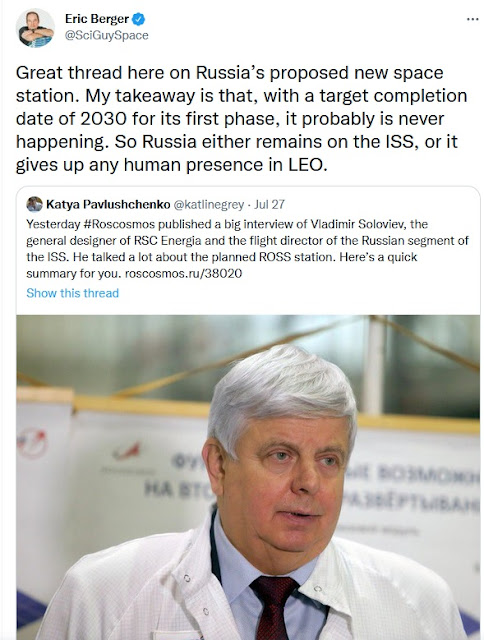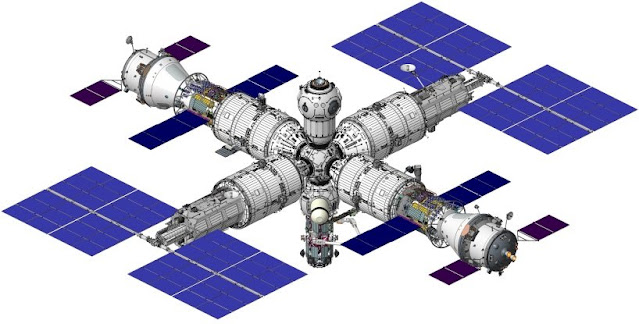Earlier this week, the story broke that the Yuri Borisov, the new head of Russia's space agency Roscosmos, said they would be abandoning the International Space Station when their current contract expires in 2024.
That story was on Tuesday, July 26. The next day, the story started to break that the situation wasn't that straightforward. The bigger picture is they're saying they're not leaving the ISS until their replacement space station is operational. I stumbled across this while trying to track down why my weekly Rocket Report from Eric Berger at Ars Technica hadn't arrived. I went looking for his Twitter account and found this:
The Tweet he references is from Katya Pavlushchenko, whom it turns out I've quoted before on a similar subject (the original "Russia is abandoning the ISS" stories last March). I understand she can read the original sources in Russian and references them in posts. Her Twitter account includes much more discussion about this and the format being spread over several screens a few lines at a time makes it hard to summarize.
The shortened version seems to be that Russia is aware that without continued work in their module on the ISS they're going to lose the valuable experience of having crews get time on orbit. The first module of what's called #ROSS on Twitter is talked about as launching in 2028.
At the first phase, #ROSS will be placed on a solar-synchronous orbit with an altitude of 334 km and inclination of 96.8°. Later it will be changed to 372 km and 96.9°. This will allow to observe most of the territory of Russia (and not only Russia, as Soloviev noticed).
This orbit will also allow to conduct the study of both Earth poles with optical, infrared, ultraviolet, radio and other detectors, and will allow to track the movement of various objects in the areas of the poles, which is an important scientific experiment.
...
#ROSS will work mostly in automatic mode, without human presence on board, but may be visited if needed. As a result, the station will be used more efficiently not only from scientific, but also from the economic point of view.
There's much more to wade through but among the key points is that it hasn't
actually been designed. Everything spoken about is more design goals
than known characteristics.
On May 27,
Roscosmos and the Council on Space of the Russian Academy of Sciences
produced this concept of the station. It appears smaller than the ISS, and if it's not going to be continuously manned, that's probably something that can be put up with. I don't recall where I heard this, but the saying was that, "the only people comfortable with the ISS are submariners."
I'm inclined to agree with Eric Berger. If Russia is really saying they're not leaving the ISS until their own station is completed, 2030 or later is likely, especially with their first launch being talked about for 2028. Recall that the ISS is expected to either be retired or require more regular maintenance by 2025.


Why would Russian bail on access to the ISS. Being allowed on it gives them opportunities to steal western technology.
ReplyDeleteTheir space program is in freefall.
ReplyDeleteJust look at that proposed illustration. Shows two non-Soyuz capsules, which were designed in the 70's, redesigned in the 80's, re-redesigned in the 90's, and basically are vaporware. Oh, sure, 'studies' have been written, and there's probably a wooden mockup somewhere moldering away, but Mother Russia hasn't been able to get 'more power' and 'newer/better' ever. They say 'Soyuz has great record, most launched, greatest number of people launched' yada yada yada. Subtle hint. We could have kept launching Gemini and put lots of people in orbit. Even expanded it a tad for 3-4 persons (or even Big Gemini with 12-15...) using 60's technology and just building and launching Gemini-Titan and Gemini-Atlas for forever and a day. Which is what Russia has been doing.
I mean, same dorky semi-cone boosters as from day 1. Gee, why not make the boosters a cylinder and store more fuel and get a bit more performance out of them and loft a bigger-better capsule system? Or more hardware and cargo?
I mean, second point, we had 3 versions of Saturn and were, if allowed to go forward, would have had a generational/modular Saturn system capable of launching everything from Big Gemini to half a million pounds to LEO using a combination of F1A engines on the main structure and on boosters and solid rocket boosters, all using the 33' main core of the Saturn first stage.
Yeah, Russia has nowhere else to go. They can't. Just look at the last module they launched for the ISS. It was supposed to launch 15-20 years ago. And it wasn't a technological leap forward like the James Webb telescope (where they literally were making the future tech for the telescope. Nope, the module was basically the same tech level as all the other Russian modules, which have lots more similarity to 60's tech than 80's tech.
I knew it was bluster of the worst kind, the type of bluster that the schoolyard bully makes when he knows he's losing.
Bah. Just look at all the issues with modules. Last I heard, none of the 'western' modules have had issues, while Russian modules have had issues from Day 1, with NASA being not told about quite a few 'potentially life threatening' episodes until years later.
No western personnel/cargo carriers have rammed the ISS and potentially destroyed it. Russia has done it over and over and over again.
Yep. Right now I'd trust JAXA (Japanese NASA) far more than Roscosmos. Heck, I'd almost trust West Taiwan (that would be Red China) more than the Russians.
Heck, I'm surprised the South Koreans haven't built a module and gotten more Koreanauts up onto the station.
The ISS was bastardized to placate/mollycoddle the Russians from the get-go, which is why it's sub-optimal (read "worthless") for any further use, like f'rinstance lunar or manned Mars missions, due to its Russia-friendly location.
ReplyDeleteAbandon the ISS, and push it into a burnout over the southern Indian Ocean, and put something up located to make lunar and Mars mission support a reality, and then whoever mans it won't need regular resupply of duct tape and baling wire to keep the pride of Russian space technology from coming apart at the seams.
Maybe they'll go to the Chinese Space Station in the meantime. People forget it's up there.
ReplyDelete